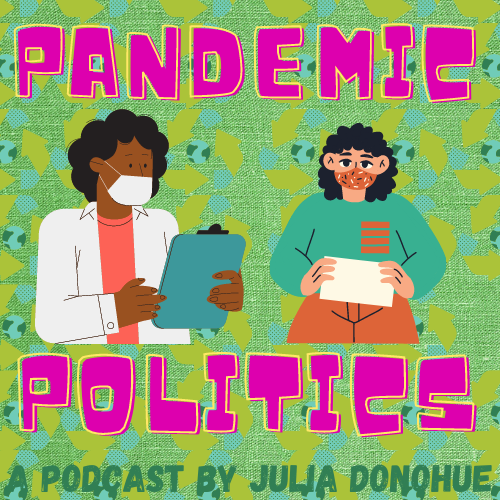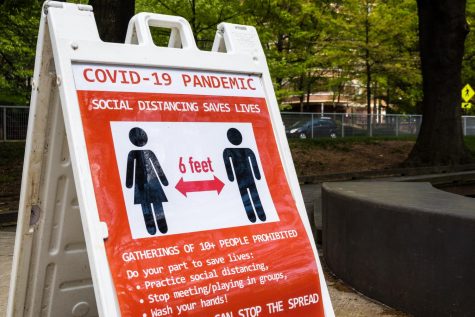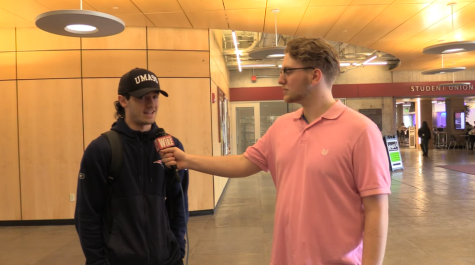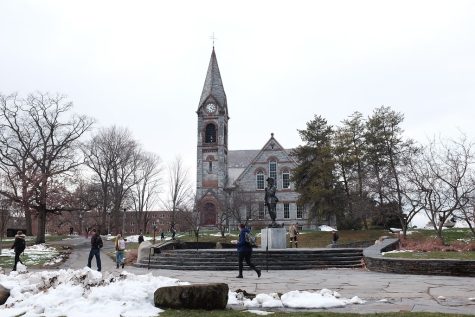Pandemic Politics: Compromise Candidates
Are young organizers pushing their centrist candidates to the left?

TRANSCRIPT
EMMA BELLA BASS-LAWRENCE
Age: 19
Rising Sophomore at Wesleyan
Organizer for Brandon Chafee (CT):
Before I moved to Connecticut, I grew up in South Florida. And I remember my parents and our family friends, it was like, like my childhood best friend and her parents would go to marriage equality rallies together, when I was maybe like four or five back when it was back when same-sex marriage was only legal in a few states was not legal in Florida yet would not be for a while longer. But I remember, like my friend, and I would make, like draw little signs of like, you know, like, two moms and two dads. There are some pictures up, but it’s cute. I feel like that’s, that’s probably when I was maybe four or five. And going to my parents would bring me along to a lot of protests like that when I was young.
LAWRENCE CIULLA
Age: 26
Co-founder of Borough Strategies (NY):
I was on a school trip, I think in like 2003. And we were in DC. And someone asked me if I was a Republican or Democrat, and I said, which one is George W. Bush? And they said, a Republican, I said that I’m definitely a Democrat. And then I think that kind of guided that up until this for like, the first like, couple years of and then like, when Obama ran, I was like, Oh, I kind of understand what it means to be a democrat now. But definitely that moment.
HANNAH STERN
Age: 18
Volunteer for Sunrise (NH, TX) and Field Organizer for Joe Biden (PA):
I guess I was probably four and my parents were talking about the 2004. election, the presidential election, and I did not, I remember that they were nervous about that. But I didn’t, I didn’t really know what that meant. I thought they were like, nervous about it. And I thought that I was like, do I need to be worried about this? And I was four and they’re like, no, like, you know, we’re concerned about this, but like, you don’t need to be like, scared about this.
“Okay, and what’s your earliest political memory?”
CHLOE MOORE
Age: 18
Social media for Anna Kelles (NY), volunteer for Veronica Pillar (Tompkins County, NY):
Barack Obama’s first inauguration. We lived in North Carolina at the time, and I was six. And so we drove up to DC. I was in my little snowsuit and I had an American flag in the back pocket. And we ended up having to walk a really long way to get in and I was like, ‘We’re going to see you get inaugurated. But we were there. We were in the crowd when he took the oath. So that was a good day.
JULIA DONOHUE: That was Chloe Moore, a rising sophomore at Macalester College. They’re one of many young people who join political campaigns during the pandemic. This is Julia Donohue, and welcome to part two of pandemic politics.
Today, we’ll be exploring how compromised candidates change campaigns and if they’re worth the effort. Moore spent the summer as a social media intern for Anna Kelles’ successful state senate campaign in New York. Currently, she’s a volunteer for Veronica Pillar’s campaign for Tompkins County legislature, the seat that Anna Kelles left.
MOORE: Basically just, you know, funneling all of our endorsements, platform, and voting information into our Instagram and our Twitter. So translating like the platform, copy from the website into more digestible, you know, graphic content. I’m the main conduit for all of our endorsements, and we’re putting them out on social media. And then also interacting with our volunteers and other electeds who are supporting us as well as local journalism, just to make sure that we have a little good blue universal enough.
DONOHUE: As Moore considers their role in social media campaigning for a politician during a pandemic, they come to the conclusion that maybe that’s not all this generation is built for.
MOORE: As a young person who works on social media, I also think that young people should be hired for jobs beyond social media, I think there’s kind of a tendency to, you know, oh, you’re young. So you must be a social media with so that’s the only thing we’re gonna hire you for, as opposed to like, bringing our viewpoints into policy and into comms and into operations, all that kind of stuff. So I do think that, you know, in the same way that you shouldn’t only hire women to lead your task force on women. You know, I do think that campaigns that don’t listen to young people are at a disadvantage. I think we bring in a really good new perspective. I think we’re, you know, effective team members. I think we bring a lot of dynamism to the conversation.
DONOHUE: Due to the inflammation of social media used by politicians and political groups, accounts have popped up across Twitter, encouraging voters and organizing their constituents. Organizer Memes is one such account. You’re about to hear a DM from a frustrated field organizer for Joe Biden.
This is anonymous which you might have seen, but it’s just says, ‘I’m wondering if there are other former Biden field organizers like me, who separate from him already not being our choice going election, which you’ve described, are so frustrated that we worked our ass off just being out with empty promises. I got him into office only told him accountable and looks like it’s still needed because no stimulus, which is no longer true. No student debt cancellation, deportation still alive and well. So what do you think of that comment? And are you satisfied with how things are going so far?
HANNAH STERN: I’m not satisfied. There was like this time where I got hopeful. And I got excited. And I thought, kind of like between the election and the inauguration. I guess I was like, I think that I just started feeling kind of hopeful. And then, yeah, well, what really got me was when the Senate voted no, on a $15 minimum wage, that felt really, I was like, oh, gosh, that felt very symbolic, I guess. Because I know, I know, so many organizers who went to Georgia, like they worked on for the presidential full time. And then they continued working full time. I just like phone banking and stuff like that? Just like, people worked so hard, so many hours. And like, so many weeks and months of your lives? That, like so many people said the whole last year, just getting people in office. And then in return, these senators told us that we don’t serve $15 an hour.
BASS-LAWRENCE: If I had a choice, I would not have wanted to work for Joe Biden. Would I ever work for a compromise candidate in the future? I mean, I think in some ways, it’s like, if I could have chosen to work… it kinda depends on the situation, because if I have the choice of working on like Joe Biden’s campaign or working for like a progressive elsewhere, I’ll choose working for progressive elsewhere. However, if I’m sort of at a point in whatever personal and professional situation I’m in, where it’s like, for a compromise candidate or get a low ranking job or something outside of politics? I don’t know.
I mean, I think part of it is that like, with Biden, he was a compromised candidate going up against such a severe and extreme and fundamental threat of a campaign. And I think that sort of underlines, you know, I feel like if Joe Biden was running against Mitt Romney, I would have been far less motivated to work for him or, as well as volunteer route vote for him than if he was running against Mr. Trump. So So I guess that might work, rationalize the compromise candidate thing,” Bass-Lawrence concludes her thought.
CIULLA: I can 1,000% understand that. It’s very difficult to see beyond, black and white politics, when, you know, you follow your heart out, you were not paid. You, you went out there in a pandemic, and your person’s not doing the things that they said that they were going to do. As a field where guys, perhaps that person failed. So, um, the other reaction is like, it’s very difficult. There’s two levels. And this is this what goes into what I like to think about the educational piece of any campaign job, where I think it’s really important that as a camp, like any campaign offer some type of like, educational piece to it to really like walk through what the campaign or like what the politics of campaigning looks like. And then the actual execution and the execution requires complaint. It’s just, it’s, it’s so not black and white, there’s levels to it. Um, I’m not going into the specific issues that like the person spoke about, but like, a lot of it requires compromise.
A lot of it requires moving the levers of government. A lot of it requires the leverage, and that’s very difficult than just firing off between when you’re a candidate or firing off a press for weeks when you’re a candidate. So, is that reaction justified? Yes and no. It’s justified in the sense of if you’re fighting your heart out for someone and that someone does not Execute what you want, especially the timeframe that you’re looking for. I get it, you think about down, like your friend told you they’d hang out today. And they said, that’s a really low-level version of that. But like, I think it’s a lot of it comes down to like what you thought you were getting out of that candidate.”
MOORE: I mean, like, for Biden, I was in Minnesota, I voted for him in Minnesota. And so I got to college. I went to some events. I, you know, it was disappointing. I voted for Warren in the primary. I think for Biden, like, Yes, I was willing to support him, despite not agreeing with him on a lot of stuff. My hope is that in the future, we will not need to do that. And I think that it’s also, you know, the scales are like on for local races and for primaries. The answer is no, I’m not working for candidates that I disagree with, like, I wouldn’t work for Amy Klobuchar. I think it’s unlikely she would lose a Democratic primary, I would still work for a challenger from the left to her because I think that it’s important that we push that conversation to the left. That being said, once you enter the general, you know, Minnesota is a swing state, I wouldn’t work for a third party candidate that I thought would take votes away from Amy Klobuchar, because I think she’s better than most of the people that the Minnesota GOP would run. So that’s kind of how I felt about Biden definitely not going to work for him in the primary, I understood that he was the, you know, the best option in the general, for local races.
LILLIAN GIBSON
Age: 18
Green New Dialer for Markey (MA) and Youth 4 Wu Facilitator (Boston, MA)
I stick with candidates that I agree with, working within the confines of the government as it is, and they are trying to please certain people, and you, if we put too much hope in like electoral politics, and it was a problem, but I think that someone like Joe Biden, there’s different people running for office, I don’t think they’re ever going to be able to hit like all the checkpoints, even if they align almost perfectly with what you believe. And I think that, no, I know, that’s like a pessimistic way of looking at it or just like, uh, I think that, um, I think that it’s, it’s important to what we’ll want, it’s important to try to support someone who you feel like, will truly get what you want done first. And I think that, like, that’s the first piece of it. I think if you have any inkling that this person may not do that, or they aren’t really appealing for real change, that I think it’s important to either recognize that, you know, put your hopes up, or find someone else to support. But I think that when it comes to this, you know, presidential election. I think that so many people were just like, oh, like that Trump’s politics was gonna be better, like automatically, but then they were forgetting like who we have in office.
DONOHUE: Despite reservations about his policies, Biden’s White House run was defined by progressive organizers in the field to punish Stern, a rising sophomore at Swarthmore College. Stern is one organizer.
STERN: I had like I had my turf that was assigned to me, it was a couple different like townships and suburbs of Philadelphia. And it was basically I was organizing volunteers to phonebank. Last month, we did a little bit of in-person canvassing stuff like that, but for most of it was all virtual. So I would call lots of people to recruit volunteers, train and set up phone banks, and different kinds of virtual events for my volunteer team as well, to build their skills and stuff like that.
DONOHUE: Stern believes that while Biden’s bid was successful, there’s more that can be done to ensure healthy environments for voters, volunteers, and organizers.
STERN: I think, like a culture shift because I think a lot of people, especially older generations, don’t really see. I just, I think that our politicians are representatives, they owe their constituents something. And they’re serving their constituents. And I don’t think that we all see it that way. In the US, I think. Sometimes we see it like that. I don’t know. There are these people and like, if they get, they gave us a meeting time, and we should thank our representatives for finding time to meet with us, stuff like that. But yeah, I think if we can kind of change our mindset and just remember that representatives are their public servants. They’re working for their constituents,
MOORE: I’m really grateful for both Anna’s campaign and now Veronica’s is the fact that they’re really cognizant of the fact that like, as the single you know, as the only young woman on the campaign that I’m like, already a kind of demographic disadvantage. And so Anna would go out of her way to, you know, ask for my opinion on the campaign. And there was an incident on Veronica’s campaign with the contractor who was with us for a while being quite unprofessional, and what turned into a very weird phone call with me. And Veronica texted me and she’s like, just want to let you know that he’s no longer working with us. And I’m having a conversation with him about the way that he treats young women in professional settings. So like that kind of fostering a healthy campaign environment is super important. Um, I think that that does fall on the candidate, and they’re like, higher-ups. And then I think there’s a part of it that, you know, I think you have to like, figure out what your limits are, if you’re signing up to volunteer, or, you know, to get hired. And that was something that I actually ended up doing my senior year of high school, I ended up being super over-committed to extracurriculars. And at the end of her semester, I was like, Okay, this is a hard decision, but I gotta let some stuff go. Because even though I love all the things that I signed up for, I can’t follow through on all of it. And so I’m gonna stick to things that are really fulfilling, and one of those things ended up being in his campaign, which was an exciting decision to make. But um, yeah, I think there’s a balance between, you know, knowing what you’re capable of committing to as an individual and then fostering a culture of, you know, sensitivity to people’s mental health and to group dynamics as a candidate or as a campaign manager.
DONOHUE: As these young organizers reflect on the unique 2020 election cycle, they’re left wondering, are compromised candidates worth the work?
STERN: So I canvassed for Heidi Sloane, who was in the primary against Julie Oliver. I didn’t personally do any work for Julie Oliver, but the Sunrise Movement did. So like, you know, there are people I know who went from Heidi to Julie Oliver. I think that’s kind of how you should be like, there were a lot of people who were like Julie’s good enough, you know, and they cannot be wrong. But there’s no reason to go for the candidate who’s good enough to go for the one that you think is going to be the best for the people. But then, once that primary is over, it is over. It was time to support Julie Oliver, and then she didn’t make it through. She was, in that case, to see what’s the better option. So that’s like my dad used to say, like in my soccer games, like, you care about winning until the game is over. So and then once the game is over, you’re thinking about the next games, that’s, you know, you have this candidate and you go for the one that’s going to be the best. And then at a certain point that candidates not anymore, and now you’re going to support the next candidate who’s going to be the best. I don’t know if you can, I can swear. But if you feel like the end of the campaign, you didn’t totally win. You lost a little bit. Because it’s not about it’s about making the world better. So you’re not making the world better. You’re not making your life a little better
DONOHUE: Straddling pragmatism and progressivism, these young organizers believe that this doesn’t have to be the future. Looking forward, they hope for less compromise and more locally based progressive candidates.
Email Julia at juliadonohue@umass.edu or follow her on Twitter @toomanyjulias










